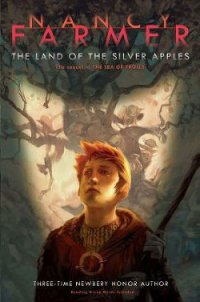Tehanu The Last Book of Earthsea - Le Guin Ursula Kroeber (читать бесплатно книги без сокращений TXT) 📗
“He sent you?” Goha inquired, disbelieving and amused. Ogion, when he wanted her, had quicker and finer messengers: an eagle calling, or only his own voice saying her name quietly- Will you come?
The man nodded. “He’s sick,” he said. “Will you be selling off any of the ewe lambs?”
“I might. You can talk to the shepherd if you like. Over by the fence there. Do you want supper? You can stay the night here if you want, but I’ll be on my way.
“Tonight?”
This time there was no amusement in her look of mild scorn. “I won’t be waiting about,” she said. She spoke for a minute with the old shepherd, Clearbrook, and then turned away, going up to the house built into the hillside by the oak grove. The messenger followed her.
In the stone-floored kitchen, a child whom he looked at once and quickly looked away from served him milk, bread, cheese, and green onions, and then went off, never saying a word. She reappeared beside the woman, both shod for travel and carrying light leather packs. The messenger followed them out, and the widow locked the farmhouse door. They all set off together, he on his business, for the message from Ogion had been a mere favor added to the serious matter of buying a breeding ram for the Lord of Re Albi; and the woman and the burned child bade him farewell where the lane turned off to the village. They went on up the road he had come down, northward and then west into the foothills of Gont Mountain.
They walked until the long summer twilight began to darken. They left the narrow road then and made camp in a dell down by a stream that ran quick and quiet, reflecting the pale evening sky between thickets of scrub willow. Goha made a bed of dry grass and willow leaves, hidden among the thickets like a hare’s form, and rolled the child up in a blanket on it. “Now,” she said, “you’re a cocoon. In the morning you’ll be a butterfly and hatch out.” She lighted no fire, but lay in her cloak beside the child and watched the stars shine one by one and listened to what the stream said quietly, until she slept.
When they woke in the cold before the dawn, she made a small fire and heated a pan of water to make oatmeal gruel for the child and herself. The little ruined butterfly came shivering from her cocoon, and Goha cooled the pan in the dewy grass so that the child could hold it and drink from it. The east was brightening above the high, dark shoulder of the mountain when they set off again.
They walked all day at the pace of a child who tired easily. The woman’s heart yearned to make haste, but she walked slowly. She was not able to carry the child any long distance, and so to make the way easier for her she told her stories.
“We’re going to see a man, an old man, called Ogion,” she told her as they trudged along the narrow road that wound upward through the forests. “He’s a wise man, and a wizard. Do you know what a wizard is, Therru?”
If the child had had a name, she did not know it or would not say it. Goha called her Therru.
She shook her head.
“Well, neither do I,” said the woman. “But I know what they can do. When I was young-older than you, but young--Ogion was my father, the way I’m your mother now. He looked after me and tried to teach me what I needed to know. He stayed with me when he’d rather have been wandering by himself. He liked to walk, all along these roads like we’re doing now, and in the forests, in the wild places. He went everywhere on the mountain, looking at things, listening. He always listened, so they called him the Silent. But he used to talk to me. He told me stories. Not only the great stories everybody learns, the heroes and the kings and the things that happened long ago and far away, but stories only he knew.” She walked on a way before she went on. “I’ll tell you one of those stories now.
“One of the things wizards can do is turn into something else-take another form. Shape-changing, they call it. An ordinary sorcerer can make himself look like somebody else, or like an animal, just so you don’t know for a minute what you’re seeing-as if he’d put on a mask. But the wizards and mages can do more than that. They can be the mask, they can truly change into another being. So a wizard, if he wanted to cross the sea and had no boat, might turn himself into a gull and fly across. But he has to be careful. If he stays a bird, he begins to think what a bird thinks and
forget what a man thinks, and he might fly off and be a gull and never a man again. So they say there was a great wizard once who liked to turn himself into a bear, and did it too often, and became a bear, and killed his own little son; and they had to hunt him down and kill him. But Ogion used to joke about it, too. Once when the mice got into his pantry and ruined the cheese, he caught one with a tiny mousetrap spell, and he held the mouse up like this and looked it in the eye and said, ‘I told you not to play mouse!’ And for a minute I thought he meant it. . .
“Well, this story is about something like shape-changing, but -Ogion said it was beyond all shape-changing he knew, because it was about being two things, two beings, at once, and in the same form, and he said that this is beyond the power of wizards. But he met with it in a little village around on the northwest coast of Gont, a place called Kemay, There was a woman there, an old fisherwoman, not a witch, not learned; but she made songs. That’s how -Ogion came to hear of her. He was wandering there, the way he did, going along the coast, listening; and he heard somebody singing, mending a net or caulking a boat and singing as they worked:
Farther west than west beyond the land
my people are dancing on the other wind.
“It was the tune and the words both that -Ogion heard, and he had never heard them before, so he asked where the song came from. And from one answer to another, he went along to where somebody said, ‘-Oh, that’s one of the songs of the Woman of Kemay.’ So he went on along to Kemay, the little fishing port where the woman lived, and he found her house down by the harbor. And he knocked on the door with his mage’s staff. And she came and opened the door.
“Now you know, you remember when we talked about names, how children have child-names, and everybody has a use-name, and maybe a nickname too. Different people may call you differently. You’re my Therru, but maybe you’ll have a Hardic use-name when you get older. But also, when you come into your womanhood, you will, if all be rightly done, be given your true name. It will be given you by one of true power, a wizard or a mage, because that is their power, their art-naming. And that’s the name you’ll maybe never tell another person, because your own self is in your true name. It is your strength, your power; but to another it is risk and burden, only to be given in utmost need and trust. But a great mage, knowing all names, may know it without your telling him.
“So Ogion, who is a great mage, stood at the door of the little house there by the seawall, and the old woman opened the door. Then Ogion stepped back, and he held up his oak staff, and put up his hand, too, like this, as if trying to protect himself from the heat of afire, and in his amazement and fear he said her true name aloud-’ Dragon!’
“In that first moment, he told me, it was no woman he saw at all in the doorway, but a blaze and glory of fire, and a glitter of gold scales and talons, and the great eyes of a dragon. They say you must not look into a dragon’s eyes.
“Then that was gone, and he saw no dragon, but an old woman standing there in the doorway, a bit stooped, a tall old fisherwoman with big hands. She looked at him as he did at her. And she said, ‘Come in, Lord Ogion.’
“So he went in. She served him fish soup, and they ate, and then they talked by her fire. He thought that she must




